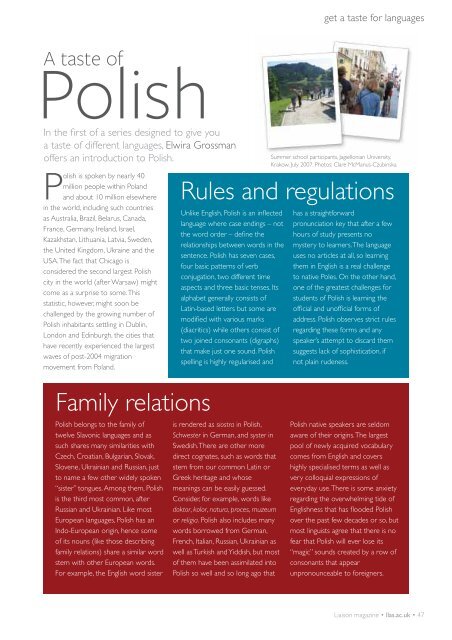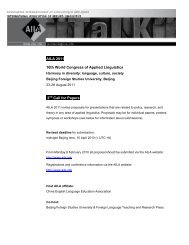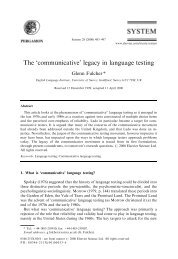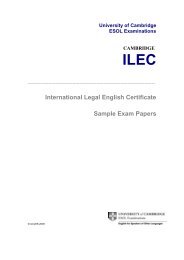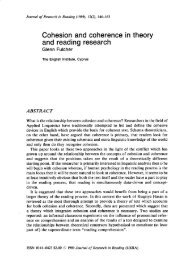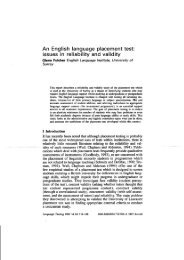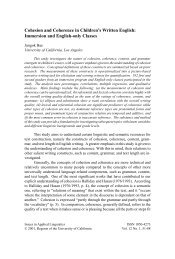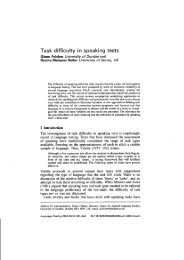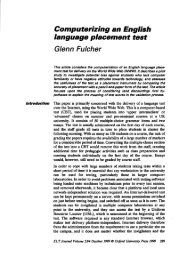Liaison Magazine - LLAS Centre for Languages, Linguistics and ...
Liaison Magazine - LLAS Centre for Languages, Linguistics and ...
Liaison Magazine - LLAS Centre for Languages, Linguistics and ...
Create successful ePaper yourself
Turn your PDF publications into a flip-book with our unique Google optimized e-Paper software.
get a taste <strong>for</strong> languages<br />
A taste of<br />
Polish<br />
In the first of a series designed to give you<br />
a taste of different languages, Elwira Grossman<br />
offers an introduction to Polish.<br />
Polish is spoken by nearly 40<br />
million people within Pol<strong>and</strong><br />
<strong>and</strong> about 10 million elsewhere<br />
in the world, including such countries<br />
as Australia, Brazil, Belarus, Canada,<br />
France, Germany, Irel<strong>and</strong>, Israel,<br />
Kazakhstan, Lithuania, Latvia, Sweden,<br />
the United Kingdom, Ukraine <strong>and</strong> the<br />
USA.The fact that Chicago is<br />
considered the second largest Polish<br />
city in the world (after Warsaw) might<br />
come as a surprise to some.This<br />
statistic, however, might soon be<br />
challenged by the growing number of<br />
Polish inhabitants settling in Dublin,<br />
London <strong>and</strong> Edinburgh, the cities that<br />
have recently experienced the largest<br />
waves of post-2004 migration<br />
movement from Pol<strong>and</strong>.<br />
Unlike English, Polish is an inflected<br />
language where case endings – not<br />
the word order – define the<br />
relationships between words in the<br />
sentence. Polish has seven cases,<br />
four basic patterns of verb<br />
conjugation, two different time<br />
aspects <strong>and</strong> three basic tenses. Its<br />
alphabet generally consists of<br />
Latin-based letters but some are<br />
modified with various marks<br />
(diacritics) while others consist of<br />
two joined consonants (digraphs)<br />
that make just one sound. Polish<br />
spelling is highly regularised <strong>and</strong><br />
Summer school participants, Jagiellonian University,<br />
Krakow, July 2007. Photos: Clare McManus-Czubinska<br />
Rules <strong>and</strong> regulations<br />
has a straight<strong>for</strong>ward<br />
pronunciation key that after a few<br />
hours of study presents no<br />
mystery to learners.The language<br />
uses no articles at all, so learning<br />
them in English is a real challenge<br />
to native Poles. On the other h<strong>and</strong>,<br />
one of the greatest challenges <strong>for</strong><br />
students of Polish is learning the<br />
official <strong>and</strong> unofficial <strong>for</strong>ms of<br />
address. Polish observes strict rules<br />
regarding these <strong>for</strong>ms <strong>and</strong> any<br />
speaker’s attempt to discard them<br />
suggests lack of sophistication, if<br />
not plain rudeness.<br />
Family relations<br />
Polish belongs to the family of<br />
twelve Slavonic languages <strong>and</strong> as<br />
such shares many similarities with<br />
Czech, Croatian, Bulgarian, Slovak,<br />
Slovene, Ukrainian <strong>and</strong> Russian, just<br />
to name a few other widely spoken<br />
“sister” tongues. Among them, Polish<br />
is the third most common, after<br />
Russian <strong>and</strong> Ukrainian. Like most<br />
European languages, Polish has an<br />
Indo-European origin, hence some<br />
of its nouns (like those describing<br />
family relations) share a similar word<br />
stem with other European words.<br />
For example, the English word sister<br />
is rendered as siostra in Polish,<br />
Schwester in German, <strong>and</strong> syster in<br />
Swedish.There are other more<br />
direct cognates, such as words that<br />
stem from our common Latin or<br />
Greek heritage <strong>and</strong> whose<br />
meanings can be easily guessed.<br />
Consider, <strong>for</strong> example, words like<br />
doktor, kolor, natura, proces, muzeum<br />
or religia. Polish also includes many<br />
words borrowed from German,<br />
French, Italian, Russian, Ukrainian as<br />
well as Turkish <strong>and</strong> Yiddish, but most<br />
of them have been assimilated into<br />
Polish so well <strong>and</strong> so long ago that<br />
Polish native speakers are seldom<br />
aware of their origins.The largest<br />
pool of newly acquired vocabulary<br />
comes from English <strong>and</strong> covers<br />
highly specialised terms as well as<br />
very colloquial expressions of<br />
everyday use.There is some anxiety<br />
regarding the overwhelming tide of<br />
Englishness that has flooded Polish<br />
over the past few decades or so, but<br />
most linguists agree that there is no<br />
fear that Polish will ever lose its<br />
“magic” sounds created by a row of<br />
consonants that appear<br />
unpronounceable to <strong>for</strong>eigners.<br />
<strong>Liaison</strong> magazine • llas.ac.uk •47


